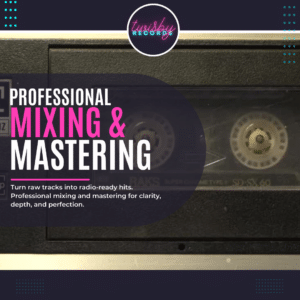Hello again my friends!
When it comes to knowing how to choose the right mixing engineer for your music, the process can feel overwhelming. As a mixing engineer myself, I know there’s no one-size-fits-all approach. Each musician’s vision is unique, and finding someone who complements your style is crucial. That’s why I’ve created this guide to help you understand what to look for when hiring a mixing engineer, so you can confidently choose someone who aligns with your creative goals.
Table of Contents
1. Define Your Budget and Expectations
Before diving into the search for a mixing engineer, it’s essential to establish a clear budget and set realistic expectations. Keep in mind that a higher budget doesn’t always guarantee better quality, but it can open doors to working with more experienced engineers. Be honest with yourself about what you’re looking to achieve and find an engineer whose rates align with your budget.
There are fantastic engineers that may charge next to nothing for their services, and there are terrible engineers that may charge thousands of dollars for their services. When choosing who to work with price should not be the sole deciding factor and there are many more things to consider!
2. Find a Mixing Engineer Who Specializes in Your Genre
Finding a mixing engineer who specializes in your genre can make a world of difference in the final sound of your music. While some engineers are versatile and work across multiple styles, others focus on mastering the nuances of specific genres. Take the time to explore their portfolio and listen to tracks similar to your own. This ensures that their expertise aligns with your musical vision, helping you achieve a sound that resonates with your audience.
Many engineers are skilled in working with multiple genres, and many engineers have niched down to become great at working in just one or two genres. Explore their portfolio for samples and see what they have done in the style of music that you have created to see if their expertise and experience would be a benefit to your music.
3. Ask for Recommendations
One of the best ways to find a trustworthy mixing engineer is through word of mouth. Reach out to your network of fellow musicians, music producers, and industry professionals to see if they have any recommendations. You might be surprised by how many connections you already have. Don’t hesitate to ask for referrals, as people in the industry are usually happy to share their positive experiences, and alot of studios give discounts for referrals. (for instance We offer discounts to new referral clients AND a credit for the artist that refers them)
The best compliment we can get in this business is a referral from satisfied clients. Word of mouth is the most powerful form of advertising in the music business. An engineer that does great work will be easier to find and vet because their work will be talked about!
This works in the reverse almost just as powerfully. Those that have bad experiences working with an engineer will also spread the word about it. Asking those you know, and seeking out reviews will help to give great insight into how good of a fit that potential mix engineer will be for you!
4. Research their Portfolio and Credits
When you have a list of potential mixing engineers, take some time to research their portfolio and credits. Look for engineers who have worked on projects similar to yours and have a proven track record. Check out their websites, social media profiles, and listen to their work on various streaming platforms. This will give you a better understanding of their capabilities and expertise.
This is also a good opportunity to sniff out potential scams. There are plenty of people out there, especially on platforms like Fiverr, that will claim to have won Grammys, or have been nominated for Grammys. These credits are out there, do your due diligence. Some unscrupulous “engineers” will claim to have been nominated for or won Grammys. They are/were either: an assistant, an intern scrubbing toilets and fetching coffee in the studio that received the nomination/award, or just flat out lying.
That’s not to say that there are not qualified people on such platforms, but please do your research to vet the claims they may make. That information will be out there, and don’t be afraid to check what the actual facts of their claims are!
Another potential scam is engineers claiming to have worked for artists that they have absolutely not worked with. Sometimes, this information can be hard to verify, but if all else fails common sense will see you through. If someone is claiming to have worked with Jay-Z (for example) but you cannot find credits that reflect this, and their only online presence is a Fiverr account, chances are they are lying through their teeth.
The last potential scam to look out for, which more often than not is almost 100% done on Fiverr is drop servicing. These people will claim that they will mix your song, or more commonly, master your song. What they will do, is charge you say, $150 for a master. This person will then pass your song off to someone else on Fiverr who’s only charging like $5, then they will just run your song through a service like Landr, eMastered, etc.
Then the original person you paid will send you your song back after they get it back from the third party. Disappearing into the sunset when you are left with $150 gone and a subpar job to show for it. Clearly, they are only taking advantage of the fact that this is gig based work and up-charging you for being a middle man to a service you could have used directly for way less money.
Seeking out real studios, and vetting the people that own and operate them, is one of the best ways of finding an engineer that you can form a long term working relationship with and the best way to protect yourself from opportunistic hacks trying to make a quick buck. We don’t recommend or endorse using Fiverr for this type of service. Even if it’s not us, we would rather you be taken care of by someone that is qualified, and cares about their craft and your music.
One of the best platforms to check an engineer’s credits on is Muso Ai. Muso Ai is a free platform that lists all confirmed credits an engineer has, as well as other metrics such as Streams generated, and their roles within that project.
5. Why Communication Matters When Choosing a Mixing Engineer
Communication matters when choosing a mixing engineer and can prevent a lot of frustration down the line. A great engineer doesn’t just have technical skills, they’re also great listeners who can interpret your creative ideas. Discuss your vision, provide references, and don’t hesitate to ask questions. Clear communication ensures that your project stays on track and the final product matches your expectations.
BUT on the other side of the coin you have to find an engineer you will respect enough to listen to their opinions. A great engineer will not shy away from giving you constructive criticism and tell you when you’re over thinking something, or just falling into demoitis.
They should be open to feedback and willing to collaborate with you to achieve the desired sound. If you’re unable to communicate effectively, it may lead to misunderstandings and ultimately, a disappointing final product.
One of the best ways to figure out if a mix engineer is a good fit for you would to be having a phone conversation with them. I know, talking on the phone can be a drag and our world is increasingly text based for communication. However, when it comes to an investment in your art such as this, it’s important to have an actual conversation about it. Some things are easier to get across through spoken word, especially with topics that are a more esoteric like the finer details for what your vision is for your music.
A phone call is also a good time to get a feel for whether your potential engineer knows what they’re talking about. Even if you don’t know the first thing about the technical side of audio, and what goes into building a mix past the tracks that make up your song. A phone conversation will give you a good sense of if they know what they are talking about, and will have the skills to give your work the service it deserves.
6. Trust Your Instincts
Sometimes, your gut feeling can be the most reliable indicator of whether a mixing engineer is the right fit for your project. If you have a strong connection with the engineer and their work, it’s a good sign that they’ll be able to bring out the best in your music. On the other hand, if something feels off or you’re not confident in their abilities, it’s probably best to continue your search.
7. Discuss Deadlines and Availability
Once you’ve found a mixing engineer you’d like to work with, make sure to discuss deadlines and availability upfront. Mixing engineers often juggle multiple projects at once, so it’s important to ensure they can dedicate the necessary time and attention to your music. Be clear about your expectations and make sure the engineer can meet your deadlines before moving forward.
Many songs and projects can be completed quickly, and many engineers will be willing to speed up the process by offering rush services in as little as 24 or same day in some cases. Unless you have a hard pressed deadline put in place by a label, or other contractual circumstances it is always best to not speed through the process. More time allows for more refinement, and will yield better results that sound better everywhere than a project that is completed in one day.
8. Read Reviews and Testimonials
Checking out reviews and testimonials from previous clients can provide valuable insight into a mixing engineer’s professionalism, work ethic, and ability to deliver high-quality results. Look for reviews on their website, social media profiles, or third-party review sites. Take note of any recurring themes or patterns in the feedback, both positive and negative. This will help you make a more informed decision about whether they’re the right fit for your project.
9. Be Open to Feedback and Collaboration
It’s essential to approach the mixing process with an open mind and a willingness to collaborate. A good mixing engineer will have valuable insights and suggestions to enhance your music. Be open to their feedback and trust their expertise, but don’t be afraid to stand up for your vision if necessary. Remember, it’s a collaborative process, and the goal is to create a final product that everyone involved is proud of.
You are looking for a long term relationship with an engineer, not just a one off, so find someone you believe can help you and you are comfortable with working with for the long term. Longer term relationships will help you establish a sound, and often lead to discounts for future records.
FAQ
How much does it cost to hire a mixing engineer?
The cost of hiring a mixing engineer can vary widely based on their experience, location, and the complexity of your project. Some engineers charge as little as $50 per track, while others may charge thousands. It’s important to balance your budget with the level of quality you need.
We charge between $120 to $600+ per song, based on the size of the project, the artist’s budget, and how much work it entails.
And while there are some talented engineers that offer mixing and mastering services for very cheap on marketplaces like fiverr, it’s important to understand that alot of people offering these services are musicians they just think they know what they are doing, and don’t charge enough to do this professionally. A major red flag is if they are charging a price that is impossible to make a living with, then they aren’t professional engineers.
What should I ask a mixing engineer before hiring them?
Have you worked with my genre before?
Can you provide examples of similar projects?
What’s your turnaround time?
Do you offer revisions?
What’s your process for revisions?
Do you offer discounts for multiple songs or long-term projects?
Can you provide a test mix or sample of my track?
Is it better to hire a freelance mixing engineer or a studio-based one?
The decision between hiring a freelance mixing engineer or a studio-based one ultimately depends on your specific needs, preferences, and how you intend to work. Both options, however, will likely involve remote collaboration in most cases. With advances in technology and file-sharing platforms, mixing engineers can now work seamlessly from anywhere, making it less common for artists to be physically present during the mixing process.
Why Most Mixing Engineers Prefer Remote Work
Mixing is a highly focused, technical process, and engineers thrive in an environment where they can work uninterrupted. Artists in the studio during the mixing stage often unintentionally disrupt the workflow. It’s common for artists to provide feedback prematurely, such as asking for adjustments like “Can you bring the vocals up?” while the engineer is still fine-tuning the kick drum or balancing the instrumental mix. This interrupts the engineer’s creative flow and can extend the mixing process significantly. For this reason, many engineers prefer to review the mix with the artist only after an initial draft is ready.
Advantages of Using a Studio-Based Engineer
If you recorded your tracks in a professional studio, it’s often better to have the in-house engineer handle the mix. These engineers are already familiar with the studio’s equipment, acoustics, and any unique quirks of the recording process that could influence the mix. This familiarity allows them to achieve a more polished and cohesive sound efficiently.
However, if you choose to mix in person at a studio instead of remotely, keep in mind that most studios will charge by the hour rather than a flat rate. This pricing model reflects the reality of in-person mixing sessions, artists can struggle to “let go” and often provide ongoing, unsolicited feedback. These interruptions not only prolong the session but can lead to a less efficient and more costly experience.
Advantages of Freelance Engineers
Freelance mixing engineers, on the other hand, often offer more affordable and flexible rates, typically working on a per-track or flat-fee basis. They may not have access to the same high-end equipment as a professional studio, but experienced freelancers often make up for this with a deep understanding of mixing software, plugins, and home studio setups. Freelancers are ideal if you already have high-quality recordings and want to collaborate with someone remotely who can work without the hourly pressure of in-person sessions.
Both freelance and studio-based mixing engineers can deliver excellent results, but the best choice depends on your priorities. If you want a smooth, cost-effective process and don’t need to micromanage every detail, a freelance engineer is likely the better option. If you value the expertise and context of an in-house studio engineer, or if your project is closely tied to the studio’s sound, working with the studio team might be worth the extra investment. Just remember, regardless of the path you choose, the best results often come when the mixing engineer has the space and focus to do their job without constant interruptions.
So Many Choices, So Little Time
Finding the perfect mixing engineer to work with on your song requires research, patience, and a clear understanding of your own expectations. By following the steps outlined above and trusting your instincts, you’ll be well on your way to finding the right professional to help you create a polished, professional-sounding track that captures the essence of your music.
This is less about finding a freelancer to do a gig, and more about finding someone to form a working relationship with. Different people will provide different sounds, and their own unique spin on your work. Developing that working relationship over numerous songs and projects will help to expand and evolve your core sound, and help unlock a depth that you may not have ever realized before.
Your mixing engineer is a crucial part of your creative team, helping your music stand out in a crowded industry. Choosing someone who values your vision as much as their craft can make all the difference. That’s what Twisby Records is all about.
















